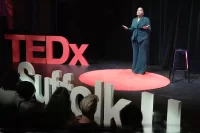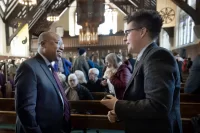Bates holds "Refugees, Displacement and Diaspora" series
In response to the plight of refugees throughout the world, Bates College will present a series of films and talks focused on “Refugees, Displacement and Diaspora” Wednesday, Nov. 3; Thursday, Nov. 4; Monday, Nov. 8; Wednesday, Nov. 10; and Thursday, Nov. 11 at various times and places on the Bates campus. “Refugees, Displacement and Diaspora” is made possible by generous support from the Christian A. Johnson Endeavor Foundation in New York. The public is invited to attend all events of the series free of charge.
“Faculty members from a range of departments wanted to see the college take a pause from normal academic activities in order to offer a program that concentrates campus energies and interests on an issue of importance and real world consequence,” said Donald W. Harward, president of Bates College. “The series is an opportunity to show how complex issues need to be examined from interdisciplinary perspectives, blending intellectual approaches.”
“International conflicts have created refugees all over the world,” said one of the conference organizers, Elizabeth Tobin, professor of history at Bates. “Although the conflicts sometimes find resolution and sometimes do not, life for these refugees and for those in permanent diasporas are forever changed. This series should be especially interesting for area residents, in light of the controversies that surfaced this summer about whether refugees from Kosovo should be settled in Lewiston.” This series of events will explore the historical and contemporary problems of refugees and the responsibilities and policies of the U.S. government, its immigration agencies and citizens. Primary events for the series include:
7:30 p.m. Wednesday, Nov. 3, Room 104 Olin Arts Center
“The Port of Last Resort” (1998): This film documents the lives of nearly 20,000 Jewish regugess who survived the Nazis in Europe by fleeing to Shanghai. Steve Hochstadt, professor of history at Bates, will introduce the film and lead a discussion after its conclusion.
7:30 p.m. Thursday, Nov. 4, in Room 104 Olin Arts Center
“Gaza Ghetto: Portrait of a Palestinian Family” (1984): Following the story of one extended family, this documentary film explores the problems of Palestinian refugees living permanently in a refugee camp.
7:30 p.m. Monday, Nov. 8, in Room G52, Pettengill Hall
“Taxi to Timbuktu” (1984): This documentary film examines African men living away from their homes and families, dispersed among strangers. Due to a drought in their village in Mali, they are forced to travel abroad, looking for work as migrants. The film focuses on the difficulties of these Malian men who earn a living for themselves and their families by driving a taxi in New York City and Tokyo.
7:30 p.m. Wednesday, Nov. 10, in Room G52, Pettengill Hall
Dawn Calabia, senior officer of the United Nations High Commissioner for Refugees, will discuss “Conflict, Displacement and the Long Road Home for Refugees: Whose Rights? Whose Wrongs? Who’s Responsible? What Should We Do?“ Calabia handles government and nongovernmental relations in the United States and Caribbean for the U.N. commissioner. This past summer she led a delegation of congressional staff members and NGO representatives to Cairo, Macedonia and Kosovo to consider refugee protection and reintegration issues. She has served as director of refugee policy and international affairs for the U.S. Catholic Conference Migration Office, one of the nation’s oldest service organizations for refugees and asylum seekers.
Calabia also has served as a staff consultant to the House International Relations Committee and as senior legislative staffer to former U.S. Rep. Stephen Solarz. One of the founders of the Women’s Commission for Refugee Women and Children, housed at the International Rescue Committee, Calabia has led numerous fact-finding missions to Central America, Southeast Asia, South Asia and Africa.
4 p.m. Thursday, Nov. 11, in Carnegie Science, Room 204
“Catholic Charities, Maine Refugees and Immigration Services,” a panel discussion with Sandra Hollett and other members of the Catholic Charities on the difficulties refugees face in southern Maine and the roles Maine residents play in creating or solving problems for refugees.
7 p.m. Thursday, Nov. 11, in G53 Pettengill Hall Shari Robertson and Michael Camerini will present “Well-Founded Fear,” a documentary film about political asylum in the United States – who deserves it and who decides. The film provides an intimate, close-up view of what goes on behind the doors of the U.S. Immigration and Naturalization Service, the dramatic real-life stage where American ideals about human rights collide with the nearly impossible task of trying to know the truth. It is a world never before seen on screen – asylum officers, lawyers, translators and foreigners trying to exploit a fragile system, as well as legitimate refugees looking for protection in the United States. The film will be aired on PBS in June 2000. The filmmakers will answer questions and lead a discussion after this special screening.
Bates offers more than 15 courses this fall that include consideration of current and past events leading to the large-scale displacement of populations and the creation of refugees.
“We want to encourage faculty who are teaching these courses to entertain questions regarding refugees in a wider context, and we believe that this series will be a very effective means of doing so,” Harward said.
The Christian A. Johnson Endeavor Foundation in New York was established in 1952 by Christian A. Johnson, a leader in the public utility and investment company industries. A financier with wide-ranging interests, Johnson derived great personal pleasure from nurturing the curiosity and intellectual development of young people with whom he came into contact, as well as from providing for many whom he did not know the financial means to help them achieve their educational goals.
For more information about the series, call 207-786-6069.




